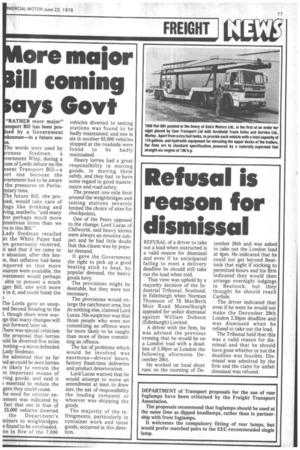ore major ill coming ays Omni
Page 19

If you've noticed an error in this article please click here to report it so we can fix it.
"RATHER more major" ansport Bill has been prosed by a Government kesman—in a future sesn.
he words were used by roness Stedman, a vernment Whip, during a use of Lords debate on the esent 'Transport Bill—a ort one because the vernment had to be aware the pressures on Parliantary time.
he future Bill, she prosed, would take care of ings like drinking and ving, seatbelts, "and many er perhaps much more ntentious items than we ye in this Bill."
ady Stedman recalled at the White Paper had en generously received, said that if we came to e situation, after this Sesm, that inflation had been nquered so that more iources were available, the wernment would perhaps able to present a much ;ger Bill, one with more e in it, and could finish the Ile Lords gave an unopsed Second Reading to the 1, though there were warigs that many changes will put forward later on.
['here was special criticism the proposal that lorries )uld be diverted five miles testing—a move defended Lady Stedman.
the admitted that as far !ad as could be seen lorries re likely to remain the st important means of ving goods, and said it 5 essential to reduce the .gers they could cause.
he need for stricter en:ement was indicated by fact that one in four of 25,000 vehicles diverted the Department's miners to weighbridges e found to be overloaded. ne in five of the 7,000 vehicles diverted to testing stations was found to be badly maintained; and one in six in another 63,000 vehicles stopped at the roadside were found to be badly maintained.
Heavy lorries had a great responsibility in moving goods, in moving them safely, and they had to have some regard to good maintenance and road safety.
The present one-mile limit around the weighbridges and testing stations severely limited the choice of sites for checkpoints.
One of the Peers opposed to the change, Lord Lucas of Chilwor-th, said heavy lorries were always an emotive subject and he had little doubt that this clause was by popular demand.
It gave the Government the right to pick up a good beating stick to beat, by popular demand, the heavy goods lorry.
The provisions might be desirable, but they were not necessary.
The provisions would enlarge the catchment area, but do nothing else, claimed Lord Lucas. His suspicion was that those people who were not committing an offence were far more likely to be caught than more of those committing an offence.
The list of problems which would be involved was enormous—drivers' hours, factory fixed-time deliveries and product deterioration.
Lord Lucas warned that he would attempt to move an amendment at least to draw into the net of responsibility the loading company or whoever was shipping the goods.
The majority of the infringments, particularly in container work and loose goods, occurred in this direction.




































































































































































